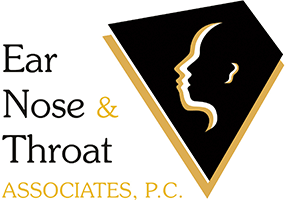Audiology & Hearing Loss Testing
Our Audiology team provides a full array of audiological diagnostic testing in addition to our full service hearing aid department, including hearing aid evaluations, sales, service and repairs.
Hearing Loss
The causes of hearing loss fall into two broad categories. “Conductive” hearing losses are the result of problems in the outer ear or middle ear which decrease the transmission of sound to the cochlea. “Sensorineural” hearing losses are the result of problems with the cochlea or cochlear nerve which transduce sounds into nerve impulses to travel to the brain. Many hearing losses can be diagnosed by an examination of the ear, but often a hearing test is necessary. Most conductive hearing losses can be corrected either by medication or surgery. Hearing aids or implantable hearing devices are also treatment options. Examples of conductive hearing losses include the following:
- Ear Wax
- Swimmers Ear
- Middle Ear Fluid
- Perforated Ear Drum
- Otosclerosis
- Cholesteatoma
- Trauma to the Ear
Sensorineural hearing losses are often permanent. Sometimes medicine may be tried to reverse certain sensorineural hearing losses but treatment with hearing aids or cochlear implants are more common. Common examples of Sensorineural hearing losses include the following:
- Aging
- Noise Damage
- Autoimmune Disease
- Genetic Causes
- Tumors
- Trauma to the Inner Ear
- Multiple Sclerosis
Diagnostic Tests for Hearing Loss
Our licensed audiologists perform a variety of diagnostic tests to help determine the severity and type of hearing loss, including:
- Audiogram – standard hearing test
- Behavioral Observation Audiometry (BOA) – a type of hearing test for infants, assessing their behavioral response to sounds
- Visual Reinforcement Audiometry (VRA) – a type of hearing test used for young children, assessing their response to sound using a head turn and a visual cue such as a toy
- Auditory Brainstem Response testing (ABR) – technology for testing electrical activity in the brain in response to sound
- Newborn Hearing Screening
- Videonystagmography (VNG) – technology for testing inner ear and central motor functions to assess vestibular function
- Tympanogram – testing to measure the function and movement of your eardrum and middle ear
- Otoacoustic Emissions (OAE) – testing to measure how well your inner ear (cochlea) works
- Acoustic Reflexes – testing that measures inner ear muscle movement in response to sound
- Electrocochleography (ECOG) – similar to an ABR, this test records electrical potentials generated in the inner ear and auditory nerve in response to sound, using an electrode placed in the ear canal or tympanic membrane
Our Audiologists work closely with your ENT physician to determine the best treatment for your hearing condition. If hearing aids are recommended, our audiologists work with you and your lifestyle to obtain and fit hearing aids to best optimize your hearing. Learn more about our Hearing Aid department here. We’ve also included a link to help navigate purchasing hearing aids.
Cochlear Patients
We offer HINT testing, AZbio testing and Cochlear Mapping for current Cochlear Implant patients. For potential candidates, we offer a Cochlear Evaluation and consultation with a neuro-otologist to discuss your options.
Hearing Restoration Options
There are many options for treating hearing loss and tinnitus. A hearing evaluation to determine the severity and type of hearing loss (conductive, sensorineural or a combination) will help determine the best course of treatment for your specific need. Some options include:
- Hearing aids
- Middle ear surgery
- Baha implants
- Cochlear Implants
